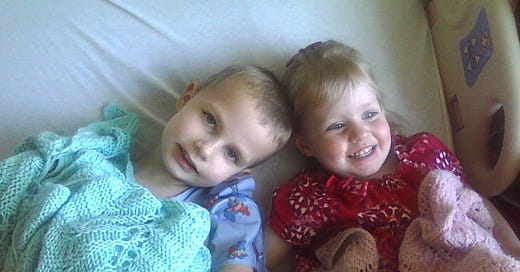Good morning!
This week I spent some time in the waiting rooms at our orthodontist and our dentist. Have you noticed how every TV in these places now rests on HGTV or the like?
I just watched a “tiny house” show where the host seemed to be attempting some marriage counseling. He tied a rope between the husband and wife and had them verbalize their grievances against each other until the rope was at its full length, pulled taut between them. Then he said, “This is as far away as you will be able to get away from each other in your tiny house.”
I do not recommend *waves hands wildly* ANY OF THIS.
The Part Where There’s an Essay: No More Pokes
“It is impossible to be ungrateful in a children’s hospital if your child is alive.” - Bomb Shelter, Mary Laura Philpott
Valentine’s Day 2011 found David and me at a linoleum-covered table in a hospital cafeteria. Our two youngest children were eight flights up in our son’s room on the step-down floor in the children’s hospital. A Child Life volunteer was watching them as we enjoyed our dinner.
There was no problem with the food that night, but I don’t remember tasting it. The dinner was an admirable attempt at providing normalcy to parents whose worlds had been turned upside-down. There were flowers on the table. The waitstaff was dressed up. It was kind of the hospital to go the extra mile for us. On the other hand, it all seemed like a ridiculous charade. I wanted to be grateful. I was grateful. But on the other hand, I hated it all and wanted to go home.
I looked from table to table and saw couples who looked haggard. Some had been in for just a week, like us -- the rookies. Others had a long ongoing relationship with Levine Children’s Hospital, one that began in the first weeks of their children’s lives and had no expected end date. I would meet these parents in the child life rooms and the lounges on our floor. They were dealing with much harder diagnoses than ours. In our experience with our son, we had a brief, acute encounter with something very common (appendicitis — only surprising since he was five at the time). Another one of our children has had the same affliction since then. It was the delayed diagnosis that had made it dangerous. Other families had an accurate diagnosis of something very dangerous. Cancer. Cardiac problems. Brain injuries.
But we all sat and ate a fancy dinner while the staff, volunteers, and various machines kept our children safe and alive on the floors above our heads.
That dinner fell on the seventh night of our stay at the hospital. It was the second time we stayed there within the month. During the first go-round, doctors had felt our son was finally doing better and was ready to go home. In hindsight, we know now that he was probably feeling better because his appendix had finally ruptured. Some patients report an initial relief in symptoms -- they feel better, even as the infection is spreading through their body.
It is a mixed blessing having a kid with a high pain tolerance. This same child has had ruptured eardrums twice in his life because he doesn’t feel the infection as quickly or as acutely as his siblings. When he is first aware of the pain, it’s at a level that most people wouldn’t tolerate. He was (and still is) hard to keep down.
Within two days of our first homegoing, his fever was creeping back up and he was lethargic again. Lethargic! The child who jumped up and down spontaneously, who had a belly laugh that wouldn’t quit, the endlessly curious one, was lethargic. When I called the pediatrician that Friday, he listened to my report and said in a clipped tone, “Kelly. Get your other kids squared away and take him back to the hospital. Do not go to the ER. They are going to have a room ready for you.” We were out the door within an hour.
This time, we were welcomed into a room on the eighth floor -- the step-down floor. Kids who had just been moved out of the ICU. More nurses. More attention. A heightened sense of urgency.
Most importantly to him, our patient still had access to Despicable Me on the hospital TV network.
We were checked into our room by dinner Friday night, and the staff took him downstairs for one more scan. Sure enough, his appendix was ruptured and the infection was spreading. They brought him back upstairs and got him on some intense antibiotics immediately. A few nurses said that odd, understated phrase, “he is a very sick little boy.” We were scheduled for a noontime procedure on Saturday.
Then came more needles, or as he referred to them, “pokes.” By the time the second week arrived, when he heard the door open in the middle of the night, he would cry out in his sleep, “no more pokes!”
We joined the ranks of parents who were installed into rooms alongside their kids. I have friends who have spent much longer spells in the children’s hospital, and they report what tiny routines and things become normal. Which lounge has the better coffee machine? Where can you quickly step outside for a breath of outdoor air? When will the next shift change happen? What are the hacks for navigating the hospital cafeteria menu?
Humans are remarkably adaptable, and perhaps nowhere else is this more apparent than on the floors of a children’s hospital. We develop routines, decorate, bring in the blanket from home, and make it better in any way we can. We supply the lego sets at the play tables and make room for the IV towers next to them. We ignore the absence of a going-home date. We’re thankful.
Sometimes I am asked if I resent the first misdiagnosis that sent us home too early. I don’t. The medical community is made up of human beings who are not gods. Ultimately, our son was made well, and his times (and ours) are in the Lord’s hands. We were tended to in the most kind and human of ways — with construction paper valentines, overcooked green beans, and volunteer smiles.
For the Anglophiles
Admittedly, this article is only tangentially related to our English heritage, but I thought it was interesting: President’s Day is a Weird Holiday. It Has Been Since the Beginning. The Founders thought celebrating George Washington’s birthday was too closely tied to celebrating the birthday of the monarch. (That’s what Trooping the Colour does every summer in the UK.)
Reads & Listens of the Week
Three Ukrainians on Enduring a Year of War: Interviews with people who made different choices as the war began, and what their life is like now. Hear from a cafe owner who decided to go ahead and open anyway, and a couple whose youngest child is now beginning to speak Polish.
Last week we finally watched Christopher Nolan’s movie Tenet. I appreciated this bit of humor from The New Yorker about it: Keys and Cheats for Watching Christopher Nolan’s Tenet. “Start in the middle, watch until the end, then rewind back to the middle of the film, and watch backward, to the beginning. You’ll notice that the iconic backward bullets, instead of flying from inside people’s bodies into the chambers of guns, now fly in wee little circles, triangles, and hearts.” (I also appreciated that one reviewer who said the movie felt like “a very loud math test.”)
I have a piece up on Story Warren this week about the children’s illustrator and author Ezra Jack Keats, who you might know from his most popular book The Snowy Day.
The newest entry to the Presidential race reminded me of this story of a perfectly-executed “Bless your heart.” After eighteen years in the South, I think I have only begun to understand the withering intention of this phrase.
In the spring, at the end of the day, you should smell like dirt. — Margaret Atwood




